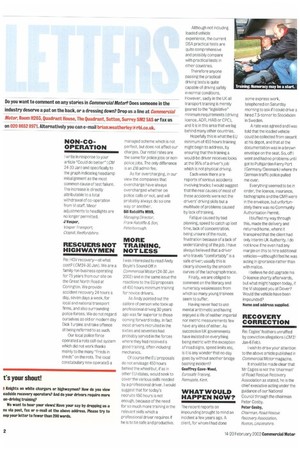MORE TRAINING, NOT LESS I was interested to read Andy
Page 22

If you've noticed an error in this article please click here to report it so we can fix it.
Boyle's Sound Off in Commercial Motor( 24-30 Jan 2002) and in the same issue the reactions to the EU proposals of 450 hours minimum training for novice drivers.
As Andy pointed out the calibre of person who took up professional driving 30 years ago was far superior to those coming forward today. In fact most drivers recruited in the sixties and seventies had probably served in the forces where they had received a good training, often including mechanics.
Of course the EU proposals do not envisage 450 hours behind the wheel but, if as in other EU states, would seek to cover the various skills needed by a professional driver. I would suggest that for today's recruits 450 hours is not enough, because of the need for so much more training in the relevant skills which a professional driver requires if he is to be safe and productive. Although not including loaded vehicle experience, the current DSA practical tests are quite comprehensive and possibly compare with practical tests in other countries.
Therefore anyone passing the practical driving tests is quite capable of driving safely in normal conditions. However, sadly in the UK all transport training is merely geared to the "legislative" minimum requirements (driving licence, ADR. HIAB or CPC), and it is in this area that we lag behind many other countries.
Hopefully this is what the EU minimum of 450 hours training might begin to address, by ensuring that the training a would-be driver receives looks at the 95% of a driver's job which is not physical driving.
Each week there are reports of serious accidents involving trucks; I would suggest that the real causes of most of these accidents were not the drivers' driving skills but a multitude of problems caused by lack of training.
Fatigue caused by bad planning, speed to catch up lost time, lack of concentration, being unsure of the route, frustration because of a lack of understanding of the job. I have always believed that a driver who travels "comfortably" is a safe driver; usually this is clearly shown by the smooth curves of the tachograph trace.
Finally, we are obliged to comment on the literacy and numeracy weaknesses from which so many young trainees seem to suffer.
Having never had to use mental arithmetic and having enjoyed a life of neither imperial nor metric measurements few have any idea of either. As successive UK governments have insisted on everything being metric with the exception of road signs, speed limits etc, is it is any wonder that no day goes by without another bridge bashing incident?
Geoffrey Cave-Wood,
Eurosafe Training, Ramsgate, Kent.












































































































































